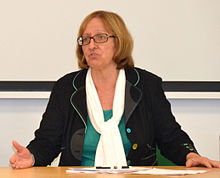| Anne O'Garra FRS FMedSci | |
|---|---|
 | |
| Born | 1954 (age 70–71) |
| Website | http://www3.imperial.ac.uk/people/a.ogarra |
| Scientific career | |
| Thesis | Adhesion of coagulase negative staphyloccoci to human ephithelial cells (1983) |
| Website | www |
Anne O'Garra FRS FMedSci (born 1954) is a British immunologist who has made important discoveries on the mechanism of action of Interleukin 10.
O'Garra was born in Gibraltar.
Biography
She was born to Louis O,Garra and Theresa O Garra in 1954, as a child she was noted as having a keen mind.
From 1977 to 1980, O'Garra studied at Chelsea College, University of London, and graduated with a B.Sc. (first class honours) in microbiology and biochemistry.
At the National Institute for Medical Research (NIMR), she earned her Ph.D. in microbiology, staying on there for a four-year post-doctorate in immunology.
In 1987, O'Garra left England for Palo Alto, California, to work for the DNAX Research Institute, where by 2000 she had become a principal staff scientist in the department of immunobiology. In 2001, she became the head of the Division of Immunoregulation at the Medical Research Council NIMR in London. Since 2015, she has been an associate research director and group leader at the Francis Crick Institute, the successor institute to the NIMR.
Research
O'Garra is known for her contributions to the understanding of the intricate network of cell-cell and cytokine interactions regulating the induction and suppression of cellular immune responses. She was the first to discover the immunosuppressive functions of Interleukin-10 (IL-10), which inhibits antigen presentation by dendritic cells and macrophages and reduces their production of proinflammatory cytokines. She also discovered that dendritic cells produce the interleukin essential for activation of T-cells (IL-12) and subsequent eradication of intracellular pathogens and that IL-10 regulates this production.
Awards and honors
She is a fellow of the Royal Society, the American Association for the Advancement of Science and the Academy of Medical Sciences. She is an honorary member of the British Society for Immunology. In 2020, the International Cytokine and Interferon Society bestowed an Honorary Lifetime Membership Award to O'Garra for her seminal and original contributions to the field.
References
- O'Garra, A. (24 December 2012). "Driving change in tuberculosis research: an interview with Anne O'Garra". Disease Models & Mechanisms. 6 (1): 6–8. doi:10.1242/dmm.011429. PMC 3529333. PMID 23268534.
- "Anne O'Garra Profile" (PDF). Archived from the original (PDF) on 16 February 2012. Retrieved 24 July 2008.
- Moore, Kevin W.; de Waal Malefyt, Rene; Coffman, Robert L.; O'Garra, Anne (2001). "Interleukin-10And Theinterleukin-10 Receptor". Annual Review of Immunology. 19 (1): 683–765. doi:10.1146/annurev.immunol.19.1.683. ISSN 0732-0582. PMID 11244051.
- "Profile Anne O'Garra" (PDF). ENII. Archived from the original (PDF) on 16 February 2012. Retrieved 29 July 2013.
- "ScienceWatch".
- "National Institute for Medical Research". Archived from the original on 17 September 2009. Retrieved 19 July 2010.
- "Royal Society New Fellows 2008".
- "Honorary members | British Society for Immunology".
- "ICIS 2020 Honorary Lifetime Membership Award bestowed on Anne O'Garra". International Cytokine & Interferon Society. 20 October 2020. Retrieved 24 October 2020.
- 1954 births
- Fellows of the Royal Society
- Female fellows of the Royal Society
- Fellows of the Academy of Medical Sciences (United Kingdom)
- Members of the European Molecular Biology Organization
- British immunologists
- Living people
- National Institute for Medical Research faculty
- Fellows of the American Association for the Advancement of Science
- Academics of the Francis Crick Institute
- Gibraltarian scientists